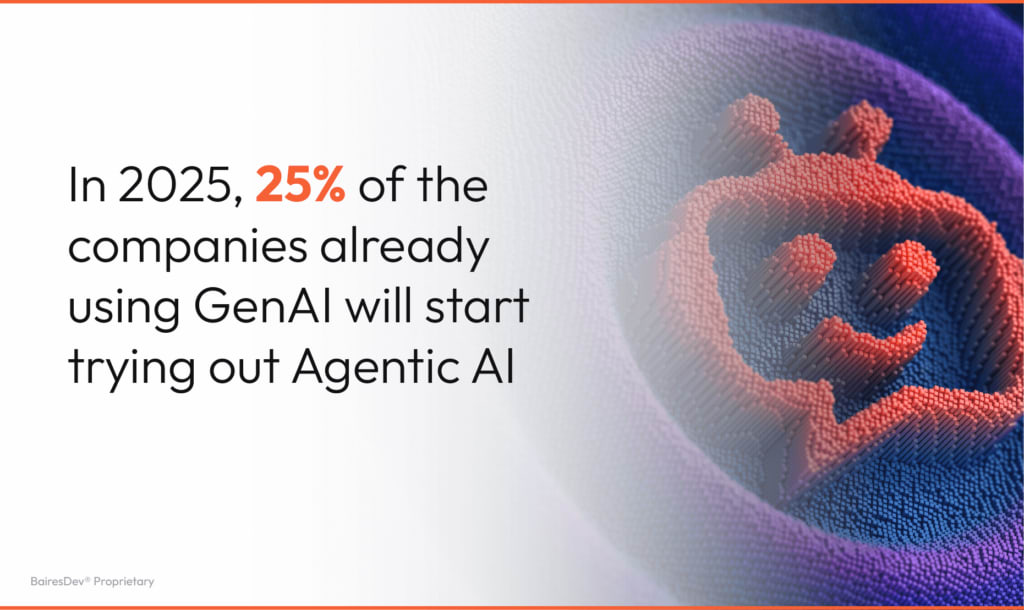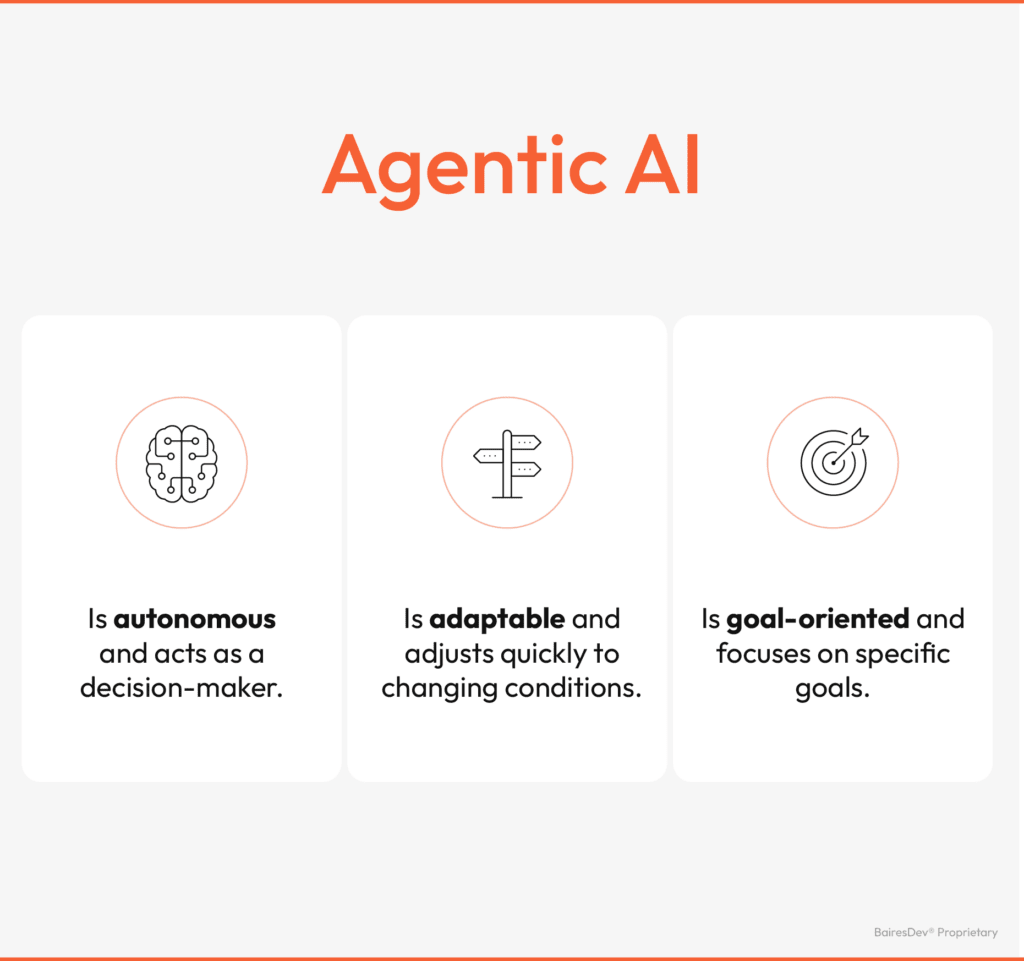Deloitte predicts that by 2025, a quarter of the companies already using generative AI will start trying out agentic AI. And with over $2 billion already invested in agentic AI startups, it’s clear this technology will drastically change how businesses work, making workflows faster and easier to scale.

What makes agentic AI so exciting? Well, it doesn’t just predict events or organize data like traditional AI systems. It can actually make its own decisions. Imagine an AI that optimizes supply chain logistics in real-time, reducing costs and delays, or one that automates personalized customer support by resolving issues based on preferences and past interactions. The opportunities are endless, and it could make businesses run smoother, earn more, and be more dependable.
A common struggle our clients face is keeping up with the massive amounts of data they need to process. On top of that, they often don’t have the resources or tools to grow as quickly as they’d like. Agentic AI could change all of that. It can proactively identify opportunities, adapt to challenges in real-time, and drive smarter actions that keep businesses ahead of the curve.
Understanding Agentic AI: What It Is and Why It Matters
Agentic AI is a type of artificial intelligence that has its own “agency,” making decisions without needing someone to guide it every step of the way. It uses machine learning or reinforcement learning to improve its decision-making capabilities over time. What makes it really interesting is how it can monitor what’s happening around it, recognize patterns, and adapt to changes—all while keeping specific goals in mind. To understand it better, here’s a breakdown of its three key principles: autonomy, adaptability, and being goal-driven.

Autonomy
Agentic AI doesn’t need constant supervision, functioning as a decision-maker rather than just a tool. It processes data, evaluates options, and takes actions independently, all while aligned with predefined objectives. Take the financial sector as an example: Agentic AI can analyze real-time market trends, forecast potential risks, and autonomously execute trades or reallocate investments—all without human intervention. This level of independence enables businesses to respond to rapidly changing conditions with speed and precision, turning volatility into opportunity.
Adaptability
One of the standout features of agentic AI is how well it handles change. It picks up on new information and adjusts its actions accordingly. Think about logistics: if a truck’s usual route is blocked, the AI can instantly figure out a better path to keep deliveries moving. Over time, it gets better at spotting patterns and planning for similar disruptions, making operations much more efficient.
Goal Orientation
What sets agentic AI apart is its focus on achieving specific goals. It constantly evaluates its progress and tweaks its approach to stay on track. For example, in the tech industry, an AI system managing servers could detect overheating, and act right away by redistributing workloads or applying updates. This action keeps systems running without requiring manual intervention.
The Business Benefits of Agentic AI
Agentic AI is changing the way businesses handle their day-to-day operations, making them smarter and more capable of tackling challenges. We know its principles, but how do they translate to benefits?
Saving Time and Resources
Agentic AI takes over repetitive tasks and makes smart decisions based on real-time data. Unlike systems that stick to fixed rules, it adjusts to whatever’s happening at the moment.
For example, hospitals can use agentic AI to automate their customer service operations. An autonomous healthcare AI agent can access medical records, cross-reference clinical guidelines, and tailor responses based on patient history. For example, it could flag missed dosages or conflicting medications while providing real-time, personalized support. This allows medical staff to focus on critical care, ensuring patients receive timely and accurate assistance.
Smarter Decision-Making
Agentic AI doesn’t just process data—it thinks ahead and acts on it. Here’s how:
- Clear Goals: These systems work with specific, measurable targets (similar to the SMART goals technique). For example, in inventory management, the AI might aim to reduce stockouts by 15% over six months. This goal guides its decisions.
- Analyzing Data: The AI processes large sets of information, finding patterns and making connections that people might miss. For instance, a marketing AI agent could figure out what your customers like on different platforms, then use that insight to create highly targeted campaigns.
Taking Action: Once it has a plan, the agent puts it into motion. Continuing the marketing example, it could write ad copy, tailor content for Instagram, email, or other platforms, and launch the campaign. It even keeps an eye on how it’s performing and makes changes if something isn’t working as expected.
Helping Businesses Grow
Growing a business can sometimes mean juggling more tasks at the cost of quality. But with Agentic AI, you don’t have to make that trade-off. Here’s how it helps:
- Specialized Systems: AI agents can focus on tasks like customer service, compliance monitoring, or marketing. For example, a retail company could deploy agents to manage inventory, run targeted campaigns, and handle customer inquiries simultaneously—all within specialized frameworks.
- Teamwork Between Systems: Agentic AI systems can collaborate by sharing information to tackle complex workflows. In manufacturing, one agent might optimize supply chains while another schedules production, ensuring seamless operations—provided they are set up to communicate effectively.
- Full Automation: Certain tasks can run entirely on their own. A fintech company offering microloans, for instance, could use an agent to assess credit risk, approve loans, and notify customers—all autonomously, though critical decisions might still involve human oversight to ensure accuracy and fairness.
AI agents are transforming industries. Check out this video to explore more use cases, from autonomous vehicles to personal assistants and financial advisors.
Navigating the Challenges: What to Watch Out For
Agentic AI has plenty of potential, but like anything new, it comes with its own set of challenges. Let’s go through three big ones—reliability, security, and over-reliance—and talk about how to deal with them.
Reliability Issues
As with any other technology, agentic AI isn’t perfect. It isn’t completely free from hallucinations–answers that sound reasonable but are wrong. This can be a big problem in critical areas like healthcare, where mistakes can be dangerous. If there’s one place you need AI to nail it every time, it’s here.
What you can do:
- Keep an Eye on It at First: When rolling out agentic AI, don’t just let it run wild. Start with layered supervision (sometimes called “scaffolding”), where humans double-check its work until it proves it can handle tasks reliably on its own.
- Be Clear and Specific: These systems thrive on structure. The more specific and detailed the input, the better they’ll perform. In healthcare, for example, feeding the AI clear symptom descriptions and complete patient histories can make all the difference in getting accurate, useful recommendations.
Security Concerns
Another issue is security. Agentic AI relies on a lot of data to do its job. If that data is bad—or worse, malicious—it could lead to serious problems, like leaking sensitive customer information. There’s also the risk of these systems accessing or sharing information they shouldn’t. And let’s not forget the potential for bad actors to misuse AI, like crafting smarter phishing attacks or exploiting vulnerabilities in autonomous systems.
How to stay safe:
- Set Clear Rules for Data: Put policies in place to control who can access data and how it’s stored or shared.
- Validate Your Data: Use tools to check that the data being fed into the AI is reliable and hasn’t been tampered with.
- Regular Security Checks: Run frequent audits to catch and address vulnerabilities before they can be exploited.
- Set Boundaries: Define ethical guidelines for how AI should be used and what information it’s allowed to handle.
Risk of Over-Reliance
Agentic AI is powerful, but there’s a risk of leaning on it too much. Over time, people might stop paying attention to tasks the AI handles, which can lead to trouble if the system makes a mistake. For instance, if the AI misunderstands a customer’s issue—like offering the wrong solution to a billing dispute—the situation could spiral out of control without being noticed. There’s also a bigger picture here: as AI takes over more jobs, people might lose interest in building their own skills or contributing in meaningful ways.
How to avoid this:
- Find a Balance: Decide which tasks the AI can handle alone and when humans need to step in. For example, let AI recommend financial actions, but have a manager sign off on final approvals.
- Work Together: Think of AI as a partner, not a replacement. Use it to handle routine tasks so people can focus on higher-level decisions and creative work.
- Train Your Team: Make sure your team understands how Agentic AI works, so they can spot risks, fill any skill gaps, and stay involved in meaningful ways.
- Check In Regularly: Review how agentic AI is being used in your business to make sure humans are still playing a key role where it matters.
Conclusion: The Road Ahead for Agentic AI
Agentic AI can change the way businesses run, making workflows faster, smarter, and more flexible. It helps automate decisions, set clear goals, and connect different systems to work together, making it easier than ever to grow your business. Of course, there are challenges like reliability and security to think about, but with the right approach, these can be solved, and the benefits can be huge for your organization.
If you’re curious about bringing AI agents into your business but want to minimize risks, partnering with an experienced AI development team is a great way to start. We’ve already helped over 500 clients successfully with custom solutions. We can guide you step by step, tackling any challenges along the way.






